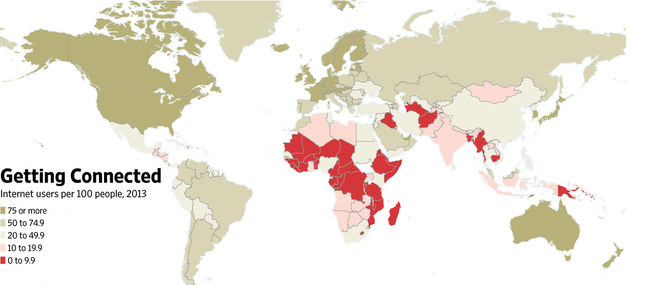Internet Imperialism and the The New Age of Empires
Evelyn M. Rusli of the Wall Street Journal writes, “Tech Companies Struggle to Get World on Internet.” She profiles Indonesia, which only has 16% of it’s 250 million population who have access to the Internet, and the aspiration of tech giants to get more people online and show them the value of the Internet. However, despite the efforts of Google and Facebook to get more people connected (and ultimately monetize through these emerging markets overtime), per a joint report done by McKinsey and Facebook, growth of online world-wide Internet users is actually slowing down.
To much of the developed world, Internet access is practically akin to oxygen. It’s hard for us to imagine life without it. But in the opposite spectrum, people in underdeveloped countries who face very extreme challenges have to go through a lot before they can even recognize the upside of smartphones and online connectivity. And what Google and Facebook are learning in these countries is that ultimately it’s about thinking of the audience’s needs and wants before their own needs and wants1 if they want these people to use their technology:
Facebook and Google have stepped up efforts to tackle the social barriers of Internet access, particularly by creating more local content. At first, Internet.org focused on improving the technological efficiency of Facebook’s applications and deals with telecom operators to drive down access costs.
That is now being coupled with a push to bundle Facebook with local services. Last summer, Facebook made an Internet.org app for Zambia that includes information on weather, local jobs and women’s organizations, in addition to Facebook’s social network.
In India, Facebook held a contest last fall to encourage local groups to build content and apps for underserved populations in India, including women and migrant workers. Getting more people online is complicated by the roughly 100 languages spoken in India.
This is a much better approach, in addition to reducing costs through cheaper and wider infrastructure, and reducing data transfer through caching technolgoy and compression.
Now, I’m bullish on the Internet and it’s been nothing short of magical for me since the first time I used it to create my Hotmail e-mail address. Moreover, I’m very happy that there are efforts being made to put more people online so they too can see the magic of having instant access to the rest of the world. And for sure the effects will reverberate throughout every fabric of society for these populations: education, politics, healthcare, agriculture, commerce, to name a few. I think this is a valiant mission, and one necessary for the advancement of human race and decreasing the gap between the rich and the poor. But I can’t shake that the image I think of when it comes to Internet.org and Google’s Project Loon is the new kind of imperialism—“Internet Imperialism” if you will.
Instead of nation states, we now have these tech giants trying to spread their influence, power, and control, in order to reap more capital back into the mothership for ages to come. These companies are in the mission to spread the value of the Internet and it’s potential to dramatically change lives akin to how the empires made it their mission to spread religion proclaiming it will save people and give them better lives. Take note that I’m not arguing or comparing the value of Internet or religion here, nor am I saying that what these Internet giants are doing is either inherently good or inherently bad2. I have a very deep admiration for these tech companies and specifically, am extremely bullish on the prospect of Facebook’s future as a technology company. I’m sure billions of people’s lives will change and improve dramatically because of more connectivity, just as it has changed and improved ours in the developed world. I’m simply making an observation that the parallels are hard to ignore and we’ve indeed entered a new age of empires.
Regardless, I hope for the best possible outcome and that the primary tenets of the open web will stay intact despite the aspirations of these tech giants. How it will play out, I’m not quite sure. Maybe the answer lies inside the Google search bar3:
Several years ago, Google ran a study in India that targeted people who hadn’t used the Internet, says Ms. Chang, the former Google executive. The company showed one woman Google’s website and told her she could search for anything by typing it into the box. The woman responded: “I want to know what the future holds.”
-
Which some have argued to be primarily opportunistic and may perhaps be a threat to net neutrality, but that’s another topic for another day. ↩
-
I don’t have a well-thought out opinion about this yet. My first reaction is that I’m excited because more people get to access the beauty of the Internet which is life-changing. My second reaction these tech giants are the ones with the capital, resources, infrastructure, and relationships to make this happen and they are also the most incentivized to take on such massive projects. Maybe it’s not such a bad thing because the net positive impact is overwhelming over any negative ones, just as Microsoft’s mission of putting a PC in every home in the ‘90s. But still, I wouldn’t discount that there’s a possibility it may affect the very premise of an Open Internet. ↩
-
This was from the same WSJ article. I thought this was really poetic. ↩
